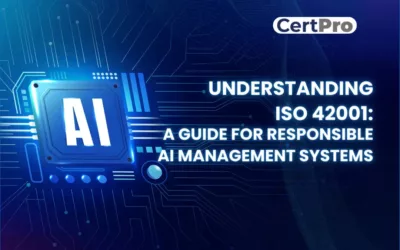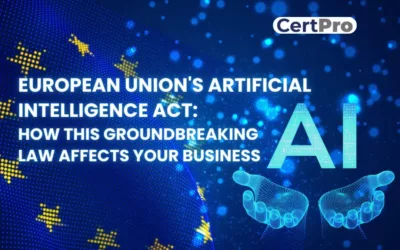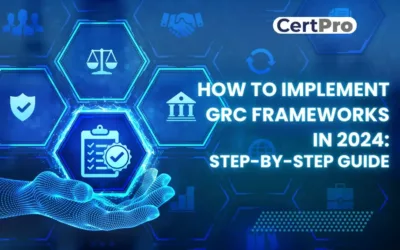ISO 20000-1:2018
IT – SERVICE MANAGEMENT
In the ever-evolving technology sector, staying ahead of the curve is exciting and challenging for IT professionals. The dynamic and rapidly evolving nature of advancements, with intricate systems and perplexing naming conventions, presents IT service management as a demanding and ever-changing field.
Amidst this landscape, ISO/IEC 20000-1 Certification services play a crucial role in helping organizations identify areas for improvement within their IT service management systems (ITSMS). ISO 20000-1 is an internationally recognized standard that provides a comprehensive framework for implementing a Service Management System (SMS) within an organization. This certification ensures the management of services according to defined quality standards. At its core, ISO 20000-1 focuses on establishing well-defined processes that align with the needs of IT companies. By adhering to this standard, organizations can effectively plan, design, transition, deliver, and continuously improve their services to meet the requirements of ISO/IEC 20000-1 Certification.
By obtaining ISO 20000-1 certification, organizations demonstrate their commitment to delivering high-quality IT services and their ability to manage and improve their service management systems. This certification provides a benchmark for organizations to establish a structured approach to IT service management and enhance their overall performance in the dynamic IT landscape.

CERTIFICATION AND AUDITING SERVICES BY CERTPRO
At CertPro, we understand the significance of adhering to ISO 20000-1:2018 standards and the benefits of obtaining ISO 20000-1 certification for organizations looking to enhance their IT service management. We offer comprehensive support to organizations seeking ISO 20000-1 certification. Our dedicated team of experts will guide you throughout the certification process, ensuring that your IT service management practices align with the latest ISO 20000-1 requirements. We will collaborate closely with your team to develop and implement a tailored service management system that meets your specific needs and industry regulations.
WHY CHOOSE CERTPRO FOR ISO 20000-1:2018 CERTIFICATION AND AUDITING?
CertPro is a trusted and trustworthy partner for ISO 20000-1:2018 certification and auditing services. With our extensive experience and in-depth knowledge gained over the years, we have a profound understanding of IT service management. Here are several compelling reasons why CertPro is the ideal choice for meeting your ISO 20000-1 certification needs:
| Factors | CertPro Advantage |
|---|---|
| Time to Certification | 4x faster than traditional approaches |
| Price | Competitive rates with flexible options |
| Process | Streamlined and efficient methodology |
| Expertise | 10+ years of industry experience |
CERTPRO’S COST-EFFECTIVE APPROACH TO ISO 20000-1:2018 CERTIFICATION
| No. of employees | Timeline | Cost (approx.) |
| 1 – 25 | 6 weeks | 4750 USD |
| 25-100 | 8 weeks | 6750 USD |
| 100-250 | 8-10 weeks | 9750 USD |
| 250 plus | 12 weeks | Custom plans |
UNDERSTANDING THE FUNDAMENTALS OF ISO 20000-1:2018
ISO 20000-1 is an internationally recognized standard that outlines the requirements for developing, implementing, monitoring, maintaining, and continuously improving an IT service management system (SMS). It is the primary section of ISO/IEC 20000 and specifies the requirements for establishing, maintaining, and continuously improving the SMS. These requirements encompass all stages of the SMS process, including planning, design, transition, delivery, and service improvement.
ISO 20000-1:2018 is the most recent version of the document, superseding the previous edition of ISO 20000-1:2011. The primary objective of the revisions in the updated version was to ensure the standard’s continued relevance and alignment with the latest advancements in service management.
The updated ISO 20000-1 provides emerging trends such as the commoditization of services, the management of multiple suppliers by service integrators, and the significance of determining service value for customers. Furthermore, changes include a restructuring of the high-level structure utilized for all management system standards and a reduction in specificity to shift the focus toward what organizations should do while allowing flexibility in determining how to achieve those objectives.
THE PRINCIPLES OF ISO 20000-1:2018 CERTIFICATION
ISO 20000-1:2018 certification helps organizations establish effective IT service management systems that prioritize customer satisfaction, continual improvement, and achieving desired outcomes from these integral principles, including:
- Customer Focus: Organizations must comprehend and fulfill the needs and expectations of their customers. It includes identifying customer requirements, maintaining effective communication, and delivering IT services that provide value and satisfaction.
- Leadership: Effective leadership involves aligning strategy, policies, procedures, and resources to achieve quality objectives. It necessitates cultivating a culture of trust and integrity, as well as providing the necessary resources, training, and accountability to individuals.
- Engagement of People: Engaging employees at all levels is crucial for ensuring efficiency. It involves effective communication, understanding their needs, sharing knowledge and experience, recognizing contributions, and fostering a culture of learning and improvement.
- Process Approach: By understanding and executing activities systematically, the process approach enhances the efficiency of output delivery. It involves comprehending the organization’s capabilities, identifying resource constraints, and proactively addressing them before taking action.
- Improvement: Continuous improvement is vital for organizations to sustain and advance their performance. It involves providing proper training, enabling employees to understand work processes, conducting planned reviews and audits, recognizing achievements, and fostering anticipation of internal and external risks and opportunities. Through these actions, organizations can enhance process performance and achieve ongoing development.
- Evidence-based Decision-making: This principle involves learning from mistakes and making decisions based on data evaluation. This approach leads to more efficient solutions while valuing intuitions that should never go unrecognized.
- Relationship Management: This principle involves effectively managing relations with relevant interested parties, including providers. It can be achieved through a well-managed supply chain, ensuring a stable flow of products and services, and identifying the relationships with interested parties that require active management.
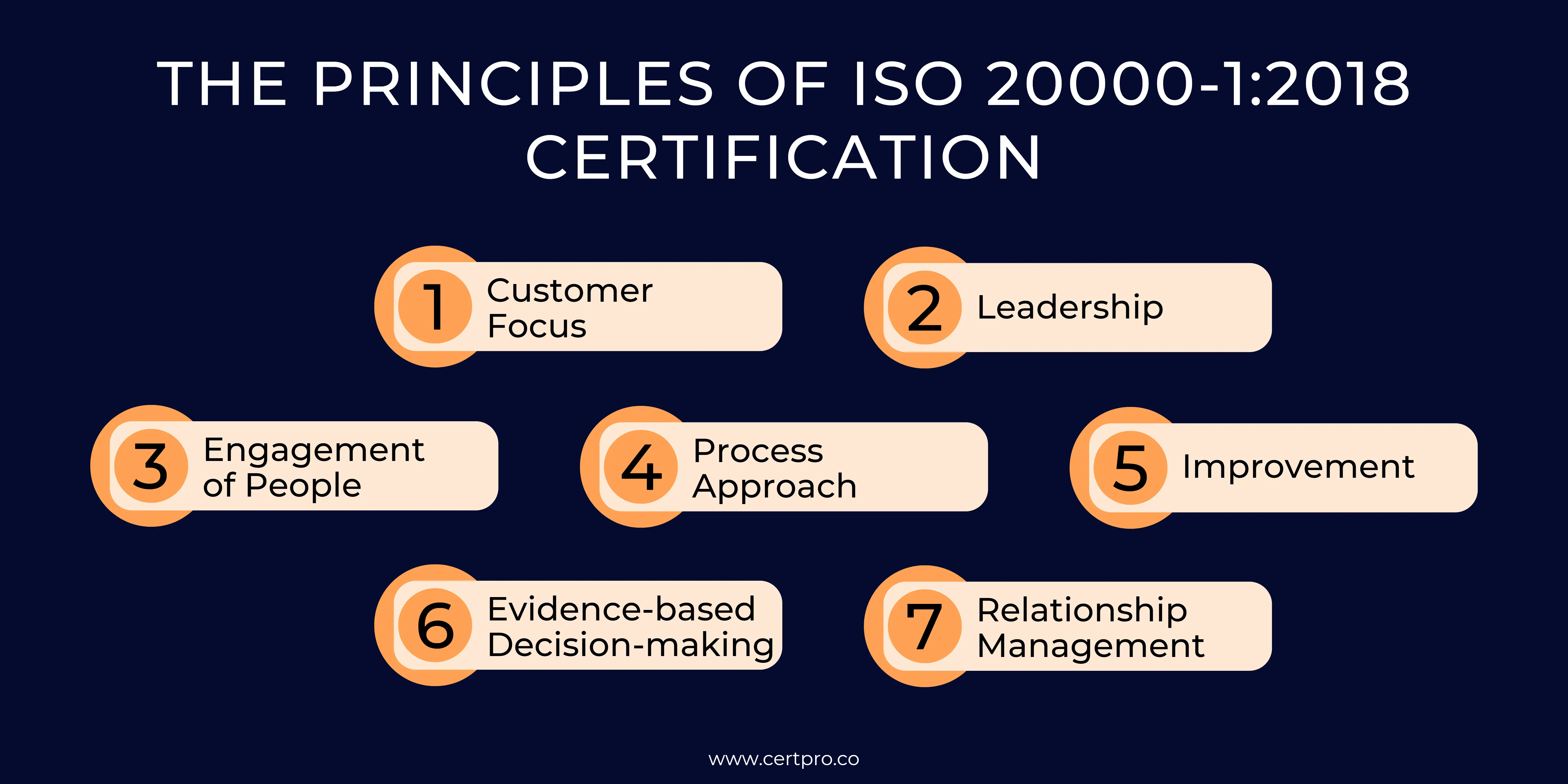
PROCESS FOR OBTAINING ISO 20000-1-2018 CERTIFICATION
You can achieve your ISO 20000-1 certification by following these steps:
Step 1: Initial Discussion and Objective Definition
Engage in in-depth discussions with the team to understand your company, management system, and ISO 20000-1 certification objectives. Through these discussions, you will get personalized and transparent offers that align with your specific requirements.
Step 2: Project Planning and Pre-Audit (Optional)
For larger certification projects, a planning meeting allows the development of an individual audit program. The pre-audit is an opportunity to assess strengths and areas for improvement in your management system beforehand.
Step 3: Certification Audit: Stage 1 and Stage 2
The certification audit begins with a system analysis (Stage 1) to evaluate your documentation, objectives, management review results, and internal audits. It determines if your management system is adequately developed and prepared for certification.
Next, during the on-site system audit (Stage 2), our auditor assesses the effectiveness of all management processes. The auditor provides a detailed presentation of the audit results and potential improvement suggestions, developing action plans collaboratively based on the audit findings.
Step 4: System Evaluation
Following the certification audit, the independent certification board evaluates the results. You will receive an audit report that includes the findings. After meeting all the standard requirements, you will receive a globally recognized certificate.
Step 5: Surveillance Audits
Conducting annual surveillance audits is essential to ensuring continuous compliance with ISO 20000-1. These audits monitor the ongoing improvement of your service management system and business processes, guaranteeing that your company maintains the essential criteria of ISO 20000-1.
Step 6: Recertification
The ISO 20000-1 certificate remains valid for three years. Recertification is conducted before expiration to ensure continued adherence to the relevant standard requirements. If the recertification process is successful, we issue a new certificate.
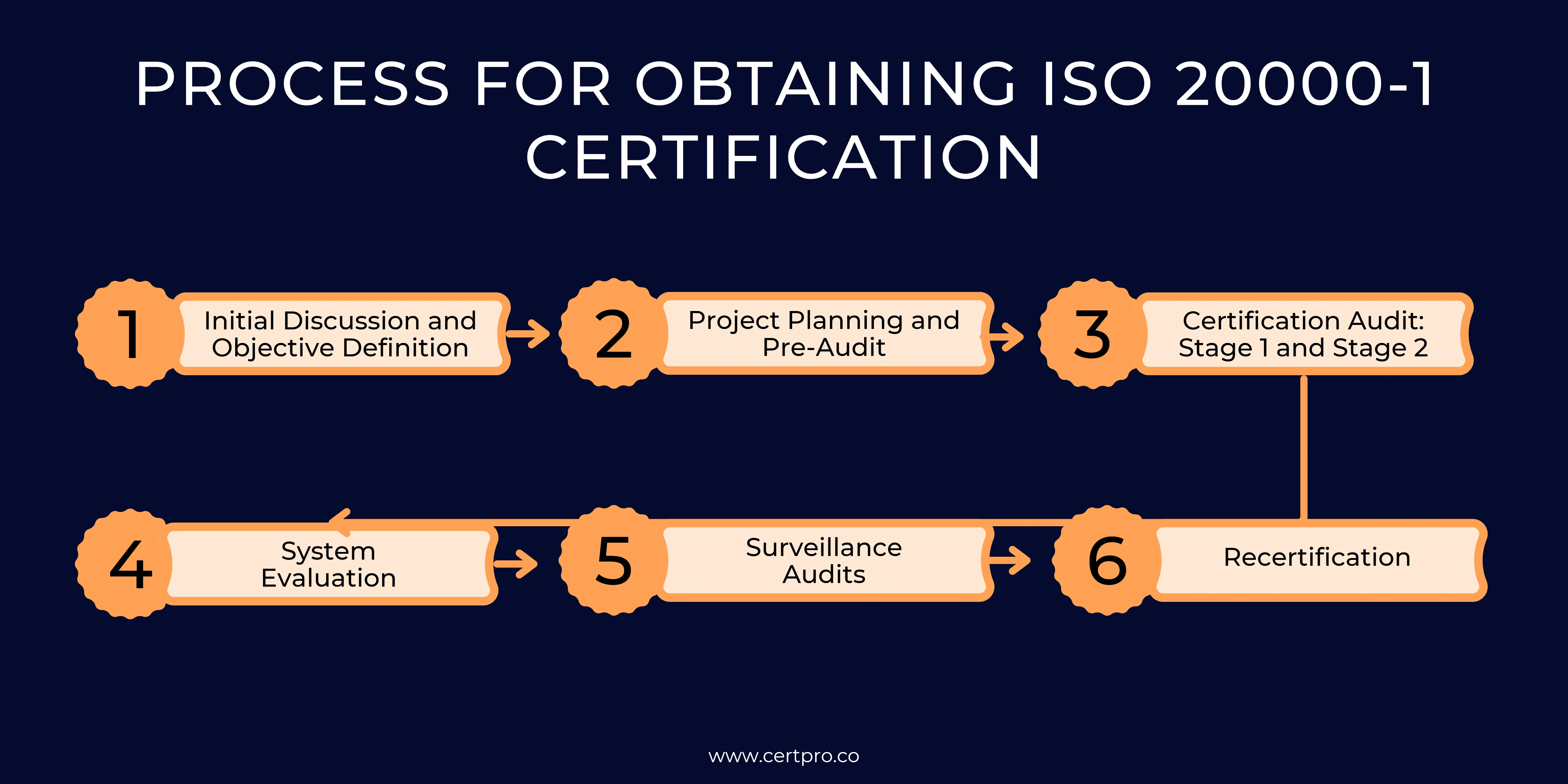
THE REQUIREMENTS OF ISO 20000-1:2018 CERTIFICATION
ISO 20000-1 standards mandate organizations to adopt practices and procedures leading to an effective Service Management System (SMS). The High-Level structure of ISO 20000-1 facilitates the smooth integration of the SMS with other management systems, ensuring coherence and compatibility across various organizational processes. While the first three sections (clauses) provide an introduction, the remaining seven outline the specifications for implementing the Service Management System (SMS).
Clause 4: Context of the Organization
This section encompasses the essential requirements for establishing, maintaining, and enhancing Service Management Systems. It places significant emphasis on defining the scope and objectives of the Service Management System (SMS) within your organization, ensuring clarity and focus on achieving desired outcomes.
Clause 5: Leadership
This section outlines the necessary specifications for top management to establish and communicate service management policies. It emphasizes their pivotal role in implementing the SMS throughout the organization and ensuring effective communication of roles and responsibilities to all employees for successful SMS implementation.
Clause 6: Planning
Planning is integral to an organization’s implementation of a service management system (SMS). This section focuses on the significance of effective planning in managing risks and threats. It also aids in determining measures to mitigate threats or Risks within the organization.
Clause 7: Support
This section highlights the essential role of support in ensuring the effectiveness of the Service Management System (SMS). It encompasses critical aspects such as resource availability, employee capabilities, awareness, internal and external communications, documented data, and knowledge management. These elements collectively contribute to supporting the service management systems within the organization.
Clause 8: Operation
This section guarantees the effective and efficient execution of processes within the Service Management System (SMS). It encompasses all stages of the SMS, including planning, control, design, and service assurance, operating across diverse areas. Its focus is on ensuring smooth and proficient operations within the SMS.
Clause 9: Performance Evaluation
This section outlines the specific requirements for implementing an audit program and conducting regular internal audits. It emphasizes the importance of conducting external and internal audits to ensure the proper implementation of service management systems within your organization.
Clause 10: Improvement
This section encompasses requirements for addressing non-conformities, implementing corrective actions, and driving continuous improvement within your organization. It promotes the organization of an effective service management system that prioritizes ongoing improvement and enhances overall performance.
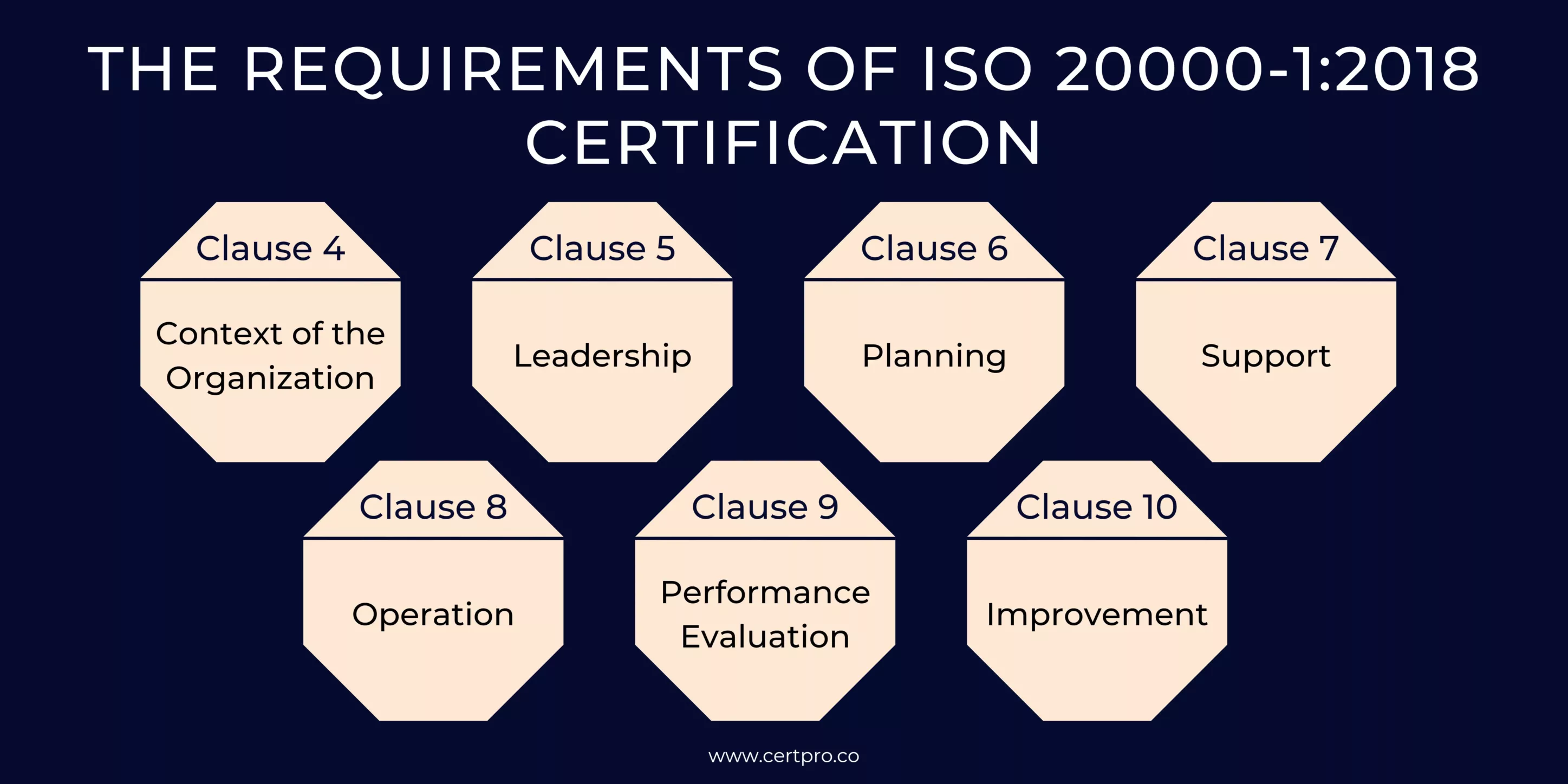
AN OVERVIEW OF ISO 20000-1 CERTIFICATION BENEFITS
The potential benefits of ISO 20000-1 are extensive, with several notable and concrete advantages. This standard empowers your organization to:
Enhanced Supplier Credibility: ISO 20000-1 certification provides organizations with a heightened level of credibility that would otherwise be difficult to attain. Being an internationally recognized standard in service management, it demonstrates adherence to best practices and compliance with a fully compliant Service Management System (SMS). For instance, an illustration of this advantage is when government agencies require ISO 20000-1 certification from suppliers submitting tenders for new projects or contracts.
Proactive Service Management: ISO 20000-1 certification promotes proactive service management to meet the expectations of customers at all times. It encourages a shift from traditional incident management, which focuses on fixing reported issues and addressing potential problems that may harm the customer experience. The ISO 20000-1 definition of “INCIDENT” includes events that have not yet affected customer service, emphasizing the importance of proactive measures in ensuring customer satisfaction.
Positive Cultural Transformation: ISO 20000-1 fosters a cultural shift within organizations, promoting a collective approach to work. It reduces blame and finger-pointing by encouraging everyone to take ownership of services rather than solely relying on the IT department for responsibilities.
Cost Reduction: Proactive service management prevents costly issues and errors, ensuring smooth operations. By minimizing incidents and improving support processes, organizations can save on expenses and minimize losses caused by business outages to reduce costs and increase financial stability.
Leadership: By actively participating in the management system, the leadership team makes sure that everyone in the organization is aware of and supportive of the requirements for service management. Their involvement facilitates the achievement of organizational objectives and goals.
ELIGIBILITY FOR ISO 20000-1 CERTIFICATION
ISO 20000-1 certification is available to any organization, regardless of size, industry, or geographical location. It applies to internal IT service providers within organizations and external IT service providers serving external clients. Whether you are a small business, a large enterprise, a government agency, or a nonprofit organization, you can pursue ISO 20000-1 certification if you have implemented an IT service management system (SMS) in line with the requirements of the ISO standard. The Certification works for organizations seeking to enhance IT service delivery, improve customer satisfaction, demonstrate compliance with best practices, and drive continuous improvement in IT service management processes. It provides a framework for organizations to align their IT services with business needs, prioritize customer satisfaction, and continually enhance their service quality.
ISO 20000-1 CERTIFICATION COST
The cost of ISO 20000-1 certification can vary depending on several factors, including the size and complexity of the organization, the scope of this certification, and the chosen certification body. It is important to note that the cost encompasses more than just the certification process. Organizations should consider the expenses associated with implementing the necessary changes to meet the requirements of ISO 20000-1. It includes conducting a gap analysis, developing and implementing new processes, training employees, and conducting internal audits.
Additionally, there are costs related to engaging a certification body to assess and certify the organization’s compliance with the standard. Typically, the costs associated with ISO 20000-1 certification include payment for initial certification fees, conducting annual surveillance audits, and periodically performing recertification audits.
We recommend organizations contact certification bodies and request customized quotes based on their needs and circumstances. This approach will provide an accurate understanding of the total cost of ISO 20000-1 certification.
CHALLENGES AND SOLUTIONS IN ISO 20000-1 CERTIFICATION
The implementation process of ISO 20000-1 certification may present organizations with various challenges to overcome. Recognizing and addressing these challenges is crucial for successful certification. Here are some common challenges and corresponding solutions for ISO 20000-1 Certification:
Challenges in ISO 20000-1 Certification:
- Lack of management support: The implementation process can face obstacles without active support from management. It is significant to involve and engage management throughout the journey, ensuring their commitment to the certification and its objectives.
- Limited resources: Insufficient resources can impede the effective execution of ISO 20000-1. Adequate allocation of resources, including budget, staff, and tools, is essential to support the certification process and ensure its success.
- Lack of employee buy-in: Employee engagement and buy-in are critical for the success of ISO 20000-1. Clear communication, training, and involvement of employees in the implementation process can help foster their commitment and support.
- Scope creep: Allowing the project scope to exceed defined boundaries can result in delays and challenges in obtaining ISO 20000-1 certification. Effectively managing the project scope requires regular reviews and careful control of any changes.
- Communication gaps: Inadequate communication hampers collaboration and understanding among stakeholders. Addressing communication gaps and promoting collaboration involves implementing effective communication channels, encouraging open dialogue, and providing regular updates.
Solutions for ISO 20000-1 Certification Challenges:
- Involve and gain active support from management to ensure their commitment throughout the process.
- Allocate adequate resources, including budget, staff, and tools, to support the implementation effectively.
- Foster employee buy-in through clear communication, training, and involving them in the implementation process.
- Define and manage the project scope effectively to prevent scope creep and maintain focus.
- Implement effective communication channels to enhance collaboration, bridge gaps, and ensure better understanding among stakeholders.
By recognizing and addressing these challenges effectively, organizations can navigate the ISO 20000-1 certification process more effectively and achieve successful outcomes in their IT service management systems.
CERTPRO: YOUR TRUSTED PARTNER IN ACHIEVING ISO 20000-1:2018 CERTIFICATION
CertPro specializes in providing expert assistance to businesses seeking ISO 20000-1:2018 certification standardized for IT Service Management (ITSM) Systems. With a team of experienced auditors and consultants, CertPro guides your business through the certification process, ensuring compliance with ISO 20000-1 requirements. They assess your IT service management system, identify areas for improvement, and help implement effective methods and controls. CertPro provides documentation support, training, and expert guidance to align your organization with ISO 20000-1 standards. By partnering with CertPro, your business can demonstrate its commitment to delivering high-quality IT services, improving customer satisfaction, and enhancing operational efficiency. Achieving ISO 20000-1:2018 certification with CertPro’s assistance showcases your organization’s ability to meet international best practices in IT service management and sets you apart as a trusted IT service provider.
FAQ’s
WHY IS ISO 20000-1 CERTIFICATION ESSENTIAL FOR ORGANIZATIONS?
ISO 20000-1 certification is essential for organizations as it establishes effective IT service management systems, enhances service quality, improves customer satisfaction, ensures alignment with best practices, mitigates risks, and provides a competitive edge by demonstrating adherence to international standards for IT service management.
HOW LONG IS ISO 20000-1 CERTIFICATION VALID?
The validity of ISO 20000-1 certification varies depending on the certification body and its specific requirements. Typically, ISO 20000-1 Certification is valid for three years. During this time, organizations are subject to regular surveillance audits to ensure ongoing compliance with the standard. After the initial certification period, organizations can seek recertification to maintain the validity of their ISO 20000-1 certification.
HOW LONG DOES IT TAKE TO GET ISO 20000-1 CERTIFIED?
The time required to achieve ISO 20000-1 certification varies depending on several factors, including the organization’s size, complexity, and existing processes. It can take several months, a year, or more to complete the implementation process and undergo the certification audit.
WHAT IS THE DIFFERENCE BETWEEN ISO 20000-1 AND ITIL?
ISO 20000-1 is a standard that defines the requirements for IT service management systems, while ITIL (IT Infrastructure Library) is a framework of best practices for IT service management. ISO 20000-1 certifies compliance with the standard, while ITIL guides the implementation of effective IT service management processes.
WHAT ARE THE REQUIREMENTS TO MAINTAIN ISO 20000-1 CERTIFICATION?
To maintain ISO 20000-1 certification, organizations must undergo regular surveillance audits by the certification body to ensure ongoing compliance with the standard’s requirements. They should also continually improve their IT service management system and address any non-conformities identified during audits.
UNDERSTANDING ISO 42001: A GUIDE FOR RESPONSIBLE AI MANAGEMENT SYSTEMS
The invention of artificial intelligence (AI) has changed the operational processes of many industries. However, the rapid growth of technology increases ethical, security, and privacy-related concerns. Therefore, the International Organization for Standardization...
EUROPEAN UNION’S ARTIFICIAL INTELLIGENCE ACT: HOW THIS GROUNDBREAKING LAW AFFECTS YOUR BUSINESS
Nowadays, Artificial Intelligence (AI) is transforming our lives exceptionally well. AI is now streamlining healthcare services, providing virtual assistance, and fulfilling queries. Technologies have boons and curses. Similarly, AI creates many concerns about...
How to Implement GRC Frameworks in 2024: Step-by-Step Guide
The rapidly evolving business environment, complexity, and accountability enhance the importance of the organization's governance, risk management, and compliance initiatives. Therefore, if your company finds difficulties expanding, recheck your organization's...

